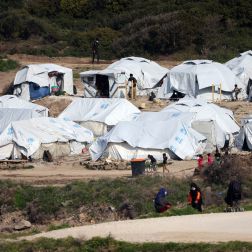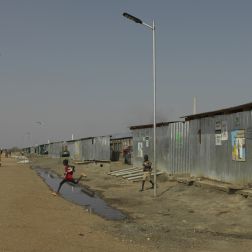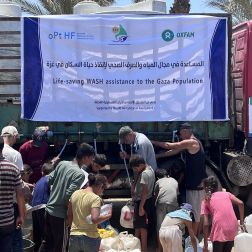- 7 mins read time
- Published: 2nd March 2016
The migrants' winter walk: Oxfam calls for safe passage of refugees to Europe

Nearly 60 million people around the world are now officially “displaced” from their homes – the highest figure recorded by the United Nations since the Second World War.
Millions of these refugees are fleeing poverty and conflicts in Syria, Afghanistan and Iraq. Some of them are making the difficult journey to Europe in the hope of a better life for them and their children.
In January 2016, the total number of arrivals of refugees to Europe reached 1,167,475 but at least 3,810 women, men and children are dead or missing, lost during the journey at sea or over land.

These are not just numbers, they are real people.
“People are arriving here exhausted, hungry and thirsty and often in need of urgent medical attention.” Riccardo Sansone Oxfam’s Humanitarian Coordinator in Serbia.  Fatheh, 45, (pictured above) is travelling alone with her 4 children. She had to flee Syria, but her husband stayed to take care of his mother who is too old for such a long and difficult journey. “Mine and my relatives’ homes were totally destroyed. There are no buildings left in my neighbourhood. We started going from one place to another. We were refugees inside our own country until we had nowhere to go. At that point, we had no other option but to leave Syria and become refugees. Even if the war ended, I don‘t think we’d ever come back home”.
Fatheh, 45, (pictured above) is travelling alone with her 4 children. She had to flee Syria, but her husband stayed to take care of his mother who is too old for such a long and difficult journey. “Mine and my relatives’ homes were totally destroyed. There are no buildings left in my neighbourhood. We started going from one place to another. We were refugees inside our own country until we had nowhere to go. At that point, we had no other option but to leave Syria and become refugees. Even if the war ended, I don‘t think we’d ever come back home”.  Smart phones are a life-line to migrants and refugees. They help them to plan their journeys and stay in touch with their families. At Oxfam we recognise the importance of information sharing. We are working on the ground to provide refugees with information on safe roads, places, and their human and asylum rights.
Smart phones are a life-line to migrants and refugees. They help them to plan their journeys and stay in touch with their families. At Oxfam we recognise the importance of information sharing. We are working on the ground to provide refugees with information on safe roads, places, and their human and asylum rights.  Between October 2015 and January 2016, 985,600 arrivals were documented in Serbia and Macedonia. Many of the refugees along this route come from Syria, Afghanistan and Iraq. To cross Serbia refugees must be granted a travel pass which gives them 72 hours to cross the border out of the country. Most refugees, who are mostly women, children and elderly people, make this journey on buses, trains and on foot. For most of the route there are no, or inadequate water, sanitation and hygiene facilities. We believe that everyone has a right to safe water, sanitation and hygiene as a basic essential service. So far we have supplied vulnerable people with portable latrines, sanitary and waste containers and sanitation equipment such as soap and toilet paper in three areas of Serbia.
Between October 2015 and January 2016, 985,600 arrivals were documented in Serbia and Macedonia. Many of the refugees along this route come from Syria, Afghanistan and Iraq. To cross Serbia refugees must be granted a travel pass which gives them 72 hours to cross the border out of the country. Most refugees, who are mostly women, children and elderly people, make this journey on buses, trains and on foot. For most of the route there are no, or inadequate water, sanitation and hygiene facilities. We believe that everyone has a right to safe water, sanitation and hygiene as a basic essential service. So far we have supplied vulnerable people with portable latrines, sanitary and waste containers and sanitation equipment such as soap and toilet paper in three areas of Serbia.  Khalid (pictured above) has wrapped his children in a blanket to protect them from the cold as he carries them towards the Serbian border. He and his family, like millions of others, have fled the ongoing war in Syria. People are only able to take the possessions that they can carry and are not prepared for the winter conditions that they face along the Balkans route, where temperatures drop below -16°C (3°F). Oxfam has supplied around 100,000 refugees and migrants with urgently needed winter items (such as jackets, underwear, gloves, cups, blankets and scarves) during the cold winter months in Dimitrovgrad, Sid, Preševo (Serbia).
Khalid (pictured above) has wrapped his children in a blanket to protect them from the cold as he carries them towards the Serbian border. He and his family, like millions of others, have fled the ongoing war in Syria. People are only able to take the possessions that they can carry and are not prepared for the winter conditions that they face along the Balkans route, where temperatures drop below -16°C (3°F). Oxfam has supplied around 100,000 refugees and migrants with urgently needed winter items (such as jackets, underwear, gloves, cups, blankets and scarves) during the cold winter months in Dimitrovgrad, Sid, Preševo (Serbia).  The opening and closing of borders only adds to the challenges that refugees face. As routes change so do the needs in each location, even the train stations become temporary camps. The Serbian government and NGOs on the ground are warning that the situation will only get worse throughout winter as the heavy snow will make the journey harder and more dangerous.
The opening and closing of borders only adds to the challenges that refugees face. As routes change so do the needs in each location, even the train stations become temporary camps. The Serbian government and NGOs on the ground are warning that the situation will only get worse throughout winter as the heavy snow will make the journey harder and more dangerous.

 Above: Sanitation facilities at Kara Tepe camp, Greece. Photo: Jodi Hilton/Oxfam We are providing hot meals to people on the Greek island of Lesbos.Thanks to the help of volunteers we are distributing meals of rice, lentils and vegetables once a day in co-operation with Save the Children. We are also preparing winter kits and clothes for distribution on Lesbos and Kos and improving water and sanitation facilities in Moria Camp, Lesbos. Border access is restricted between Greece and Macedonia: only Syrians, Iraqis and Afghans are allowed to cross, while thousands of asylum seekers from other nationalities are stuck in Greece. Life-saving emergency support for Syrian refugees in Lebanon, Syria and Jordan More than 4 million people have had to flee Syria to escape its civil war. In 2014 we reached nearly half a million refugees in Jordan and Lebanon with clean drinking water or cash and relief supplies, such as blankets and stoves and vouchers for hygiene supplies. We are helping families get the information they need about their legal and human rights and connecting them to medical, legal and support services. We have built shower and toilet blocks in refugee camps, informal settlements and on deserted routes used by people fleeing Syria and have installed or repaired toilets in communities hosting refugees. Piped water schemes are being developed for Jordan’s Zaatari refugee camp and in host communities in the Bekaa Valley in Lebanon. We are also providing clean water to Syrians inside their country through rehabilitation of infrastructure, water trucking and repairing of wells. Calling for safe passage Many refugees face brutality and poor treatment.
Above: Sanitation facilities at Kara Tepe camp, Greece. Photo: Jodi Hilton/Oxfam We are providing hot meals to people on the Greek island of Lesbos.Thanks to the help of volunteers we are distributing meals of rice, lentils and vegetables once a day in co-operation with Save the Children. We are also preparing winter kits and clothes for distribution on Lesbos and Kos and improving water and sanitation facilities in Moria Camp, Lesbos. Border access is restricted between Greece and Macedonia: only Syrians, Iraqis and Afghans are allowed to cross, while thousands of asylum seekers from other nationalities are stuck in Greece. Life-saving emergency support for Syrian refugees in Lebanon, Syria and Jordan More than 4 million people have had to flee Syria to escape its civil war. In 2014 we reached nearly half a million refugees in Jordan and Lebanon with clean drinking water or cash and relief supplies, such as blankets and stoves and vouchers for hygiene supplies. We are helping families get the information they need about their legal and human rights and connecting them to medical, legal and support services. We have built shower and toilet blocks in refugee camps, informal settlements and on deserted routes used by people fleeing Syria and have installed or repaired toilets in communities hosting refugees. Piped water schemes are being developed for Jordan’s Zaatari refugee camp and in host communities in the Bekaa Valley in Lebanon. We are also providing clean water to Syrians inside their country through rehabilitation of infrastructure, water trucking and repairing of wells. Calling for safe passage Many refugees face brutality and poor treatment.  Some are lucky enough to get to beaches where they face volunteer groups across Europe, others are not so lucky. More than 4,000 people fleeing for their lives, failed to reach the coast in 2015. Our call for safe passage is founded in the belief that all people have the right to a life of dignity. The EU must urgently provide safe and legal passage for migrants and refugees coming to Europe. Refugees and migrants must not be forced to risk their lives or resort to extremely dangerous measures to continue their journey.
Some are lucky enough to get to beaches where they face volunteer groups across Europe, others are not so lucky. More than 4,000 people fleeing for their lives, failed to reach the coast in 2015. Our call for safe passage is founded in the belief that all people have the right to a life of dignity. The EU must urgently provide safe and legal passage for migrants and refugees coming to Europe. Refugees and migrants must not be forced to risk their lives or resort to extremely dangerous measures to continue their journey.




